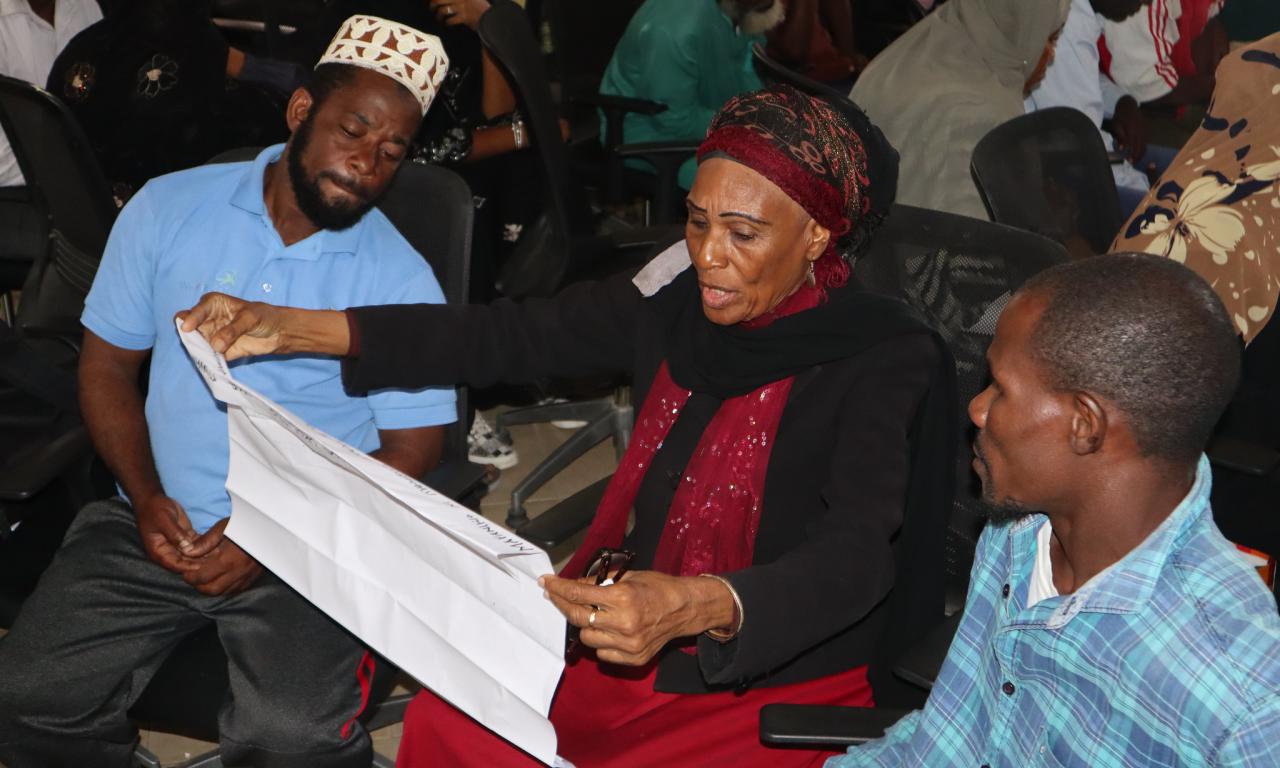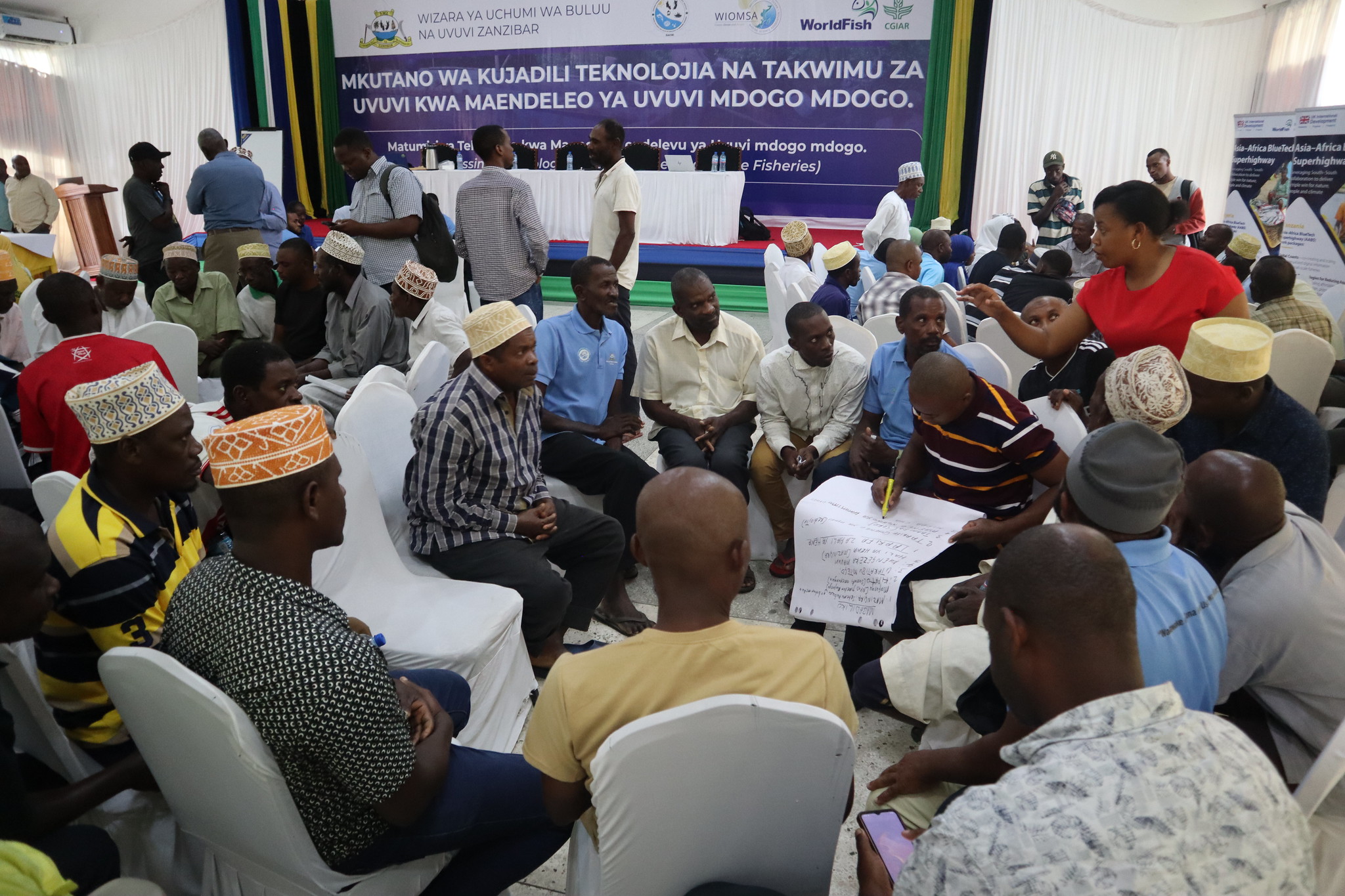
Fishers at two recent fishers’ forums in Zanzibar said they needed better prices for their fish, as well as support and guidance to improve their catches.
Organized by WorldFish, in collaboration with the Zanzibar Department of Fisheries and Aquaculture Development (DFAD), ZAFIRI, and WIOMSA, the forums were the first of this type ever held in Zanzibar.
The event brought together over 300 participants from fishing communities, government agencies, NGOs, research institutions, the private sector, academia, and international partners in maritime conservation and fishery management.
Outcomes included expressions of fishing communities’ need for data on fishing areas, seasonal patterns, and marine conditions — along with tools such as mobile phone apps that provide fishery information — to fully meet their socio-economic and food needs, while fostering a healthy marine ecology and Zanzibar’s “blue economy”.
With around 1.8 million inhabitants, Zanzibar comprises two main islands (Unguja and Pemba) off the coast of Tanzania covering a total area of just over 2,500 square kilometers. It has 880 kilometers of coastline and some 4,000 square kilometers of artisanal fishing grounds, according to the Zanzibar Fisheries Policy 2022.
Empowering Local Fishers
“Small-scale fisheries employ over 60,000 people and are important to the national economy,” said Prisca Issangya, a WorldFish research analyst working on the Asia-Africa BlueTech Superhighway project (AABS), a seven-year WorldFish initiative launched in 2023 to transform aquatic food systems in Asia and Africa through South–South collaboration.
“By allowing presentations of recent fisheries research and ecosystem health, forum like this empower local fishers with knowledge, put their feedback and challenges before policymakers, and allow the exploration of co-management approaches to safeguard marine ecosystems,” added Issangya.
Challenges voiced by small-scale fishers at the forum included a shortage of modern fishing gear and cold storage and transport for catches, as well as unreliable market access. Government representatives mentioned initiatives to address some of these issues that are underway, such as the construction of a cold market in Mkoani, Pemba.
Zanzibar fishing activities are mostly small-scale, targeting nearshore tuna and tuna-like species, small pelagic fishes, octopus, and coral reef fish using long-line, purse seine, and drifting gillnets. Fisher cited notable changes in fisheries, including reductions in the volume and species diversity of catches over the last 5–10 years.
Fishers attending the forum expressed a growing demand for location-based ocean information and better fishing tools, especially to understand potential fishing zones, climate, and ocean conditions. However, it was noted that fishers themselves can contribute as ocean stewards by adopting more sustainable practices. Training and supportive policies and technology were highlighted as key ingredients in sustainable transformation of the Zanzibar fisheries sector.

Toward a Fisheries-led Zanzibari Blue Economy
Feedback gathered during the forum will inform future AABS project activities, including data collection strategies and the development of educational resources for fishers and coastal communities.
In the coming year, the AABS project will be co-developing real-time data for policy pathways with the Ministry of Blue Economy and Fisheries, along with piloting fisher self-reporting and market incentives with Zanzibar tuna fishers, in partnership with Abalobi. Critical in this will be to teach fishery managers to use and interpret digital systems, applying the results to create or adapt fishery policies for improved sustainability and wellbeing.
“These fisher forums are an excellent way for coastal stakeholders to come together and discuss and solve problems together, so we hope this will become an annual event in Zanzibar” added Dr. Salum Hamed, Director of DFAD.
